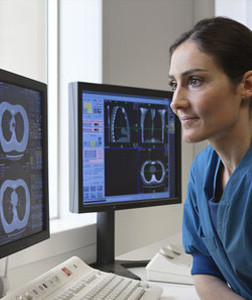Microsoft collaborates with Leading Academic Medical Systems to Advance AI in Medical Imaging
Posted on 25 Jul 2024
Medical imaging is a critical component of healthcare, with health systems spending roughly USD 65 billion annually on imaging alone, and about 80% of all hospital and health system visits involve at least one imaging exam related to over 23,000 conditions. Due to ongoing challenges such as physician burnout and staffing shortages, healthcare organizations are increasingly turning to generative artificial intelligence (AI) to alleviate workloads, enhance workflow efficiencies, and improve the accuracy and consistency of medical image analysis across care delivery, clinical trials recruitment, and drug discovery. Additionally, generative AI in radiology could improve patient experiences by reducing wait times for imaging results, thus broadening access to care and enhancing the quality of care. Now, new collaborations are set to boost the development of medical imaging copilot applications that will enrich radiologists' experiences and lead to better patient outcomes.
Microsoft Corp. (Redmond, WA, USA) has entered into collaborations with leading academic medical systems Mass General Brigham (Boston, MA, USA) and the University of Wisconsin School of Medicine and Public Health (Madison, WI, USA) along with its partnering health system, UW Health, (Madison, WI, USA). These partnerships aim to tackle major radiology challenges and promote the advancement of AI in medical imaging to enhance clinician efficiency and support superior health outcomes. These collaborations will focus on the development of high-performing multimodal AI foundation models, leveraging the secure Microsoft Azure AI platform and building upon the Nuance (a Microsoft company) suite of radiology applications to offer a variety of high-value medical imaging copilot applications.

By utilizing appropriate multimodal data-enriched medical imaging foundation models, Microsoft and its partners plan to investigate how advanced algorithms and applications can assist radiologists and other clinicians in interpreting medical images, aiding with report generation, disease classification, and structured data analysis. Microsoft has a long-standing commitment to exploring high-performing advanced foundation models and copilot experiences to enhance global capabilities. Furthermore, Microsoft has been at the forefront in medical imaging research and biomedical natural language processing, collaborating with medical experts to make AI more accessible and empower researchers, hospitals, life sciences organizations, and healthcare providers to develop innovative models and systems.
Through these collaborative efforts, researchers and clinicians at Mass General Brigham, UW School of Medicine and Public Health, and UW Health will work alongside Microsoft to push the boundaries of state-of-the-art multimodal foundation models. They will focus on developing, testing, and validating cutting-edge technologies, integrating real-world applications into clinical workflows, including through Nuance’s PowerScribe radiology reporting platform—widely used by U.S. radiologists—and the Nuance Precision Imaging Network, which facilitates the automated and scalable use of third-party medical imaging AI models across various modalities and specialties.
“Generative AI has transformative potential to overcome traditional barriers in AI product development and to accelerate the impact of these technologies on clinical care. As healthcare leaders, we need to carefully and responsibly develop and evaluate such tools to ensure high-quality care is in no way compromised,” said Keith J. Dreyer, D.O., Ph.D., chief data science officer and chief imaging officer at Mass General Brigham and leader of the Mass General Brigham AI business. “Foundation models fine-tuned on Mass General Brigham’s vast multimodal longitudinal data assets can enable a shorter development cycle of AI/ML-based software as a medical device and other clinical applications, for example, to automate the segmentation of organs and abnormalities in medical imaging and increase radiologists’ efficiency and consistency.”
“Our institutions have a reputation for embracing technical innovations as opportunities to lead the transformation of our field with new scientific discovery and improvement in clinical care,” said Scott Reeder, M.D., Ph.D., chair of the Department of Radiology, University of Wisconsin School of Medicine and Public Health, and radiologist at UW Health. “We are excited to collaborate with Microsoft on the development, validation and thoughtful clinical investigation of generative AI in the medical imaging space. Our focus is to bridge the gap within medical imaging from innovation to patient care in ways that improve outcomes and make innovative care more accessible.”
“We are proud to announce our expanded collaborations with leading institutions like Mass General Brigham and UW. Along with other industry partners, our joint efforts aim to leverage the power of imaging foundation models to improve experiences and workflow efficiency across the radiology ecosystem in a way that is reliable, transparent and secure,” said Peter Durlach, corporate vice president, Microsoft Health and Life Sciences. “Together, we are not only advancing medical imaging, but also helping deliver more accessible and better-quality patient care in a very resource-constrained environment.”














